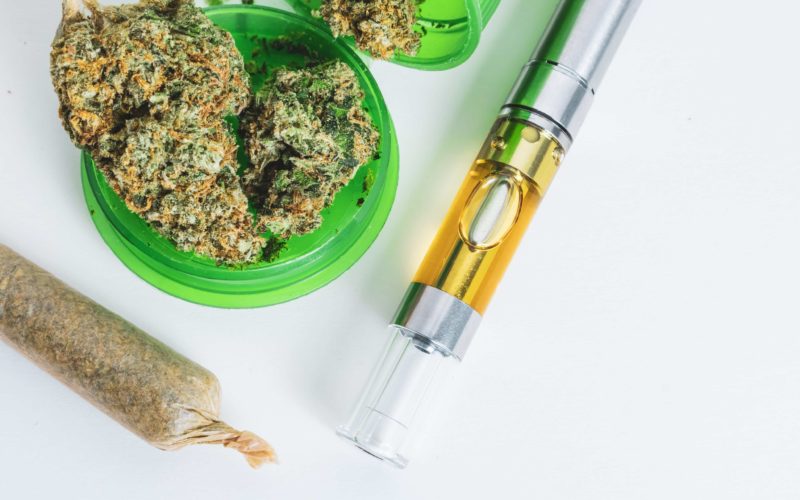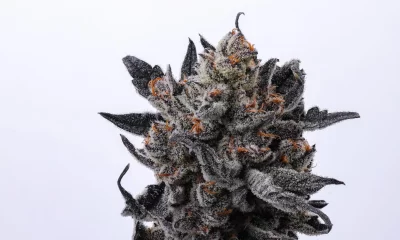Government
Oklahoma Puts Moratorium On Issuing New Medical Cannabis Licenses

Oklahoma cannabis regulators have placed a two-year moratorium on issuing licenses for new medical pot businesses in the state.
State officials in Oklahoma have put a moratorium on issuing new licenses for medical marijuana businesses in a bid to allow the state’s cannabis regulators to catch up with oversight of a burgeoning medicinal cannabis industry. Under the moratorium, which was passed by state lawmakers earlier this year, no new licenses for medical growers, processors or dispensaries will be issued by the Oklahoma Medical Marijuana Authority (OMMA) for a period of at least two years.
Oklahoma voters legalized the use and sale of medical pot with the approval of State Question 788 in 2018, a ballot measure that created the least tightly regulated legal cannabis market in the nation. Corbin Wyatt, owner of Likewise Dispensary, said that the state’s medical marijuana law included few barriers to entry for entrepreneurs seeking opportunities in cannabis.
“It was easy,” Wyatt told local media. “You pay $2,500 and you can open your business pretty much anywhere.”
In May, Oklahoma lawmakers passed House Bill 3208, which puts a two-year pause on issuing new licenses for medical cannabis businesses. The new restrictions under the measure were originally scheduled to become effective on August 1, but bills must go into effect at least 90 days after passage unless they gain a two-thirds majority vote in the legislature. The bill was signed by Governor Kevin Stitt on May 26, making it effective on August 26 under state law.
Applications for new medical cannabis businesses submitted before the moratorium goes into effect will be processed by the OMMA. But applications that are denied or received after the deadline will not be considered until 2024 at the earliest.
Mark Woodward, public information officer for the Oklahoma Bureau of Narcotics (OBN), said the state already has over 2,200 medical dispensaries, making oversight of the businesses by state regulators a logistical challenge.
“That’s a tremendous amount of dispensaries,” Woodward told a Tulsa television news crew. “It’s more than California, Oregon, Alaska, Washington, Nevada and New Mexico combined.”
Unlicensed Businesses Are Operating Outside the Law
Woodward said that many of the businesses that have been operating in the state, even some that have been licensed by the OMMA, have been producing cannabis for shipment out of Oklahoma illegally. He added that some of the state’s 8,500 medical weed cultivators have ties to organized crime organizations from the United States, Mexico, and China that have moved into the state, many during the COVID-19 pandemic, to take advantage of Oklahoma’s inexpensive licensing fees and relatively lax cannabis regulations.
“We’ve talked to our law enforcement partners from New York to Florida, and they say we are the number one supplier of black market marijuana on the East Coast,” he said.
Woodward said that some of the state’s licensed medical dispensaries are selling cannabis that has been produced by illicit growers and processors. He added that the pause in new businesses will give regulators and the OBN an opportunity to regulate the state’s medical marijuana supply chain more closely.
“This moratorium will allow us to focus on those we already have in place and make sure they’re either following the law or going after those bad actors,” he explained.
Matt Boyd, the owner of the Green Cross Meds cannabis dispensary in Tulsa, said that the state’s saturated market has caused profits from his business to drop by two-thirds.
“In the last year, I’m not the only dispensary owner that has felt a decline in business, and it’s not because of anything we’ve done different,” he explained. “It’s just because there’s been so many dispensaries that have opened up. Just the limit of ‘no more new dispensaries’ coming into business is gonna help all of us existing dispensary owners now.”
Boyd said that the two-year moratorium on new retailer licenses will slow the impact on existing retailers.
“It’s time to allow a market that’s brand new, a brand-new grassroots industry in our state, to kinda have some balance, y’know?” Boyd said. “And that’s just what it’s gonna take.”
Oklahoma lawmakers recently passed a total of 12 bills to tighten regulations on the state’s medical cannabis industry, including a requirement that new dispensaries and cultivation operations be located at least 1,000 ft. from schools. The moratorium on the issuance of new licenses is scheduled to be in effect until August 1, 2024, or until the medical marijuana authority catches up on the backlog of pending applications. But some business owners believe that may never happen.
“Until the OMMA either feels that they are able to control everything and it’s an opportune time to issue new licenses, but most people are saying that won’t ever come,” Wyatt said.
Source: https://hightimes.com/news/oklahoma-puts-moratorium-on-issuing-new-medical-cannabis-licenses/
Business
New Mexico cannabis operator fined, loses license for alleged BioTrack fraud

New Mexico regulators fined a cannabis operator nearly $300,000 and revoked its license after the company allegedly created fake reports in the state’s traceability software.
The New Mexico Cannabis Control Division (CCD) accused marijuana manufacturer and retailer Golden Roots of 11 violations, according to Albuquerque Business First.
Golden Roots operates the The Cannabis Revolution Dispensary.
The majority of the violations are related to the Albuquerque company’s improper use of BioTrack, which has been New Mexico’s track-and-trace vendor since 2015.
The CCD alleges Golden Roots reported marijuana production only two months after it had received its vertically integrated license, according to Albuquerque Business First.
Because cannabis takes longer than two months to be cultivated, the CCD was suspicious of the report.
After inspecting the company’s premises, the CCD alleged Golden Roots reported cultivation, transportation and sales in BioTrack but wasn’t able to provide officers who inspected the site evidence that the operator was cultivating cannabis.
In April, the CCD revoked Golden Roots’ license and issued a $10,000 fine, according to the news outlet.
The company requested a hearing, which the regulator scheduled for Sept. 1.
At the hearing, the CCD testified that the company’s dried-cannabis weights in BioTrack were suspicious because they didn’t seem to accurately reflect how much weight marijuana loses as it dries.
Company employees also poorly accounted for why they were making adjustments in the system of up to 24 pounds of cannabis, making comments such as “bad” or “mistake” in the software, Albuquerque Business First reported.
Golden Roots was fined $298,972.05 – the amount regulators allege the company made selling products that weren’t properly accounted for in BioTrack.
The CCD has been cracking down on cannabis operators accused of selling products procured from out-of-state or not grown legally:
- Regulators alleged in August that Albuquerque dispensary Sawmill Sweet Leaf sold out-of-state products and didn’t have a license for extraction.
- Paradise Exotics Distro lost its license in July after regulators alleged the company sold products made in California.
Golden Roots was the first alleged rulebreaker in New Mexico to be asked to pay a large fine.
Source: https://mjbizdaily.com/new-mexico-cannabis-operator-fined-loses-license-for-alleged-biotrack-fraud/
Business
Marijuana companies suing US attorney general in federal prohibition challenge

Four marijuana companies, including a multistate operator, have filed a lawsuit against U.S. Attorney General Merrick Garland in which they allege the federal MJ prohibition under the Controlled Substances Act is no longer constitutional.
According to the complaint, filed Thursday in U.S. District Court in Massachusetts, retailer Canna Provisions, Treevit delivery service CEO Gyasi Sellers, cultivator Wiseacre Farm and MSO Verano Holdings Corp. are all harmed by “the federal government’s unconstitutional ban on cultivating, manufacturing, distributing, or possessing intrastate marijuana.”
Verano is headquartered in Chicago but has operations in Massachusetts; the other three operators are based in Massachusetts.
The lawsuit seeks a ruling that the “Controlled Substances Act is unconstitutional as applied to the intrastate cultivation, manufacture, possession, and distribution of marijuana pursuant to state law.”
The companies want the case to go before the U.S. Supreme Court.
They hired prominent law firm Boies Schiller Flexner to represent them.
The New York-based firm’s principal is David Boies, whose former clients include Microsoft, former presidential candidate Al Gore and Elizabeth Holmes’ disgraced startup Theranos.
Similar challenges to the federal Controlled Substances Act (CSA) have failed.
One such challenge led to a landmark Supreme Court decision in 2005.
In Gonzalez vs. Raich, the highest court in the United States ruled in a 6-3 decision that the commerce clause of the U.S. Constitution gave Congress the power to outlaw marijuana federally, even though state laws allow the cultivation and sale of cannabis.
In the 18 years since that ruling, 23 states and the District of Columbia have legalized adult-use marijuana and the federal government has allowed a multibillion-dollar cannabis industry to thrive.
Since both Congress and the U.S. Department of Justice, currently headed by Garland, have declined to intervene in state-licensed marijuana markets, the key facts that led to the Supreme Court’s 2005 ruling “no longer apply,” Boies said in a statement Thursday.
“The Supreme Court has since made clear that the federal government lacks the authority to regulate purely intrastate commerce,” Boies said.
“Moreover, the facts on which those precedents are based are no longer true.”
Verano President Darren Weiss said in a statement the company is “prepared to bring this case all the way to the Supreme Court in order to align federal law with how Congress has acted for years.”
While the Biden administration’s push to reschedule marijuana would help solve marijuana operators’ federal tax woes, neither rescheduling nor modest Congressional reforms such as the SAFER Banking Act “solve the fundamental issue,” Weiss added.
“The application of the CSA to lawful state-run cannabis business is an unconstitutional overreach on state sovereignty that has led to decades of harm, failed businesses, lost jobs, and unsafe working conditions.”
Business
Alabama to make another attempt Dec. 1 to award medical cannabis licenses

Alabama regulators are targeting Dec. 1 to award the first batch of medical cannabis business licenses after the agency’s first two attempts were scrapped because of scoring errors and litigation.
The first licenses will be awarded to individual cultivators, delivery providers, processors, dispensaries and state testing labs, according to the Alabama Medical Cannabis Commission (AMCC).
Then, on Dec. 12, the AMCC will award licenses for vertically integrated operations, a designation set primarily for multistate operators.
Licenses are expected to be handed out 28 days after they have been awarded, so MMJ production could begin in early January, according to the Alabama Daily News.
That means MMJ products could be available for patients around early March, an AMCC spokesperson told the media outlet.
Regulators initially awarded 21 business licenses in June, only to void them after applicants alleged inconsistencies with how the applications were scored.
Then, in August, the state awarded 24 different licenses – 19 went to June recipients – only to reverse themselves again and scratch those licenses after spurned applicants filed lawsuits.
A state judge dismissed a lawsuit filed by Chicago-based MSO Verano Holdings Corp., but another lawsuit is pending.
Source: https://mjbizdaily.com/alabama-plans-to-award-medical-cannabis-licenses-dec-1/
-

 Business2 years ago
Business2 years agoPot Odor Does Not Justify Probable Cause for Vehicle Searches, Minnesota Court Affirms
-

 Business2 years ago
Business2 years agoNew Mexico cannabis operator fined, loses license for alleged BioTrack fraud
-

 Business2 years ago
Business2 years agoAlabama to make another attempt Dec. 1 to award medical cannabis licenses
-

 Business2 years ago
Business2 years agoWashington State Pays Out $9.4 Million in Refunds Relating to Drug Convictions
-

 Business2 years ago
Business2 years agoMarijuana companies suing US attorney general in federal prohibition challenge
-

 Business2 years ago
Business2 years agoLegal Marijuana Handed A Nothing Burger From NY State
-

 Business2 years ago
Business2 years agoCan Cannabis Help Seasonal Depression
-

 Blogs2 years ago
Blogs2 years agoCannabis Art Is Flourishing On Etsy













